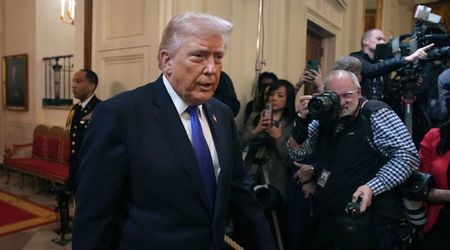‘Unfathomable’: Republicans slam Biden administration for extending $10B Iran sanctions waiver amid escalating tensions in Middle East

WASHINGTON, DC: The Biden administration is facing sharp criticism over its decision to extend a controversial sanctions waiver allowing billions of dollars to flow into Iran.
This comes amid escalating tensions in the Middle East, including deadly attacks on American forces and an assault on Israel.
Extension of sanctions waiver
Last month, the White House extended the waiver, unlocking up to $10 billion in frozen funds by enabling Iraq to pay the Iranian government for electricity services. Critics argue that this decision is reckless, especially in the light of recent events such as the drone attack by Iran-backed militants in Jordan, which claimed the lives of three US service members and injured dozens more.
The State Department has defended the waiver, asserting that it is necessary for Iraq to wean itself off Iranian energy imports and develop its domestic oil and gas production. Officials insist that the unfrozen funds are strictly designated for humanitarian purposes and are subject to strict oversight.
“None of Iran’s money held in restricted accounts overseas has gone to Iran, and we have not freed up any cash to Iran. Any notion to the contrary is false and misleading.” the State Department told the New York Post in a statement on Sunday, April 14.
“That money is held in restricted accounts overseas with strict oversight and in close coordination between the Departments of Treasury and State.”
When asked if there were plans to implement additional sanctions following Saturday's, April 13, attack, the department said, “We are in ongoing engagement with allies and partners, including at the G7, on ways to increase pressure on Iran, but we cannot preview or detail measures under consideration.”
Meanwhile, the White House affirmed President Biden's stance on Iran, noting the US military's actions in preventing recent attacks and the imposition of over 500 sanctions on Iran since Biden assumed office.
“The waiver…which allows for Iraq to import Iranian energy as it works to become energy independent, continues a practice that was started by the Trump administration and has been renewed 21 times since 2018,” the White House told The Post.
“Precisely zero money from this electricity waiver is going to Iran. US sanctions remain in place and are continuing to prevent Iran’s money—whether from its oil sales under previous administrations or its electricity sales to Iraq that occurred—from flowing to Iran.”
“Under these waivers, no money has been permitted to enter Iran,” a State Department official told the Washington Free Beacon.
“These funds, which are held abroad in third countries, can only be used for transactions for the purchase of food, agricultural commodities, medicine, medical devices, and other non-sanctionable transactions. The money goes straight to the trusted vendor or financial institution in another country. The money never touches Iran.”
Republicans express concerns
However, Republican lawmakers have raised concerns about the lack of transparency and accountability surrounding the use of these funds. They argue that the money could be funneled into state-sanctioned terrorist operations in Iran, rather than being used for humanitarian purposes.
A group of 13 Republican senators, led by Senate Banking, Housing, and Urban Affairs Committee Ranking Member Tim Scott, penned a letter to Treasury Secretary Janet Yellen and Secretary of State Antony Blinken, urging an end to the sanction waivers.
They described it as "unfathomable" that the Biden administration believes making the funds potentially available to Iran serves US national security interests.
"If we want to actually restore deterrence in the region, those funds should be placed further out of Iran’s reach, not closer,” the letter stated.
During a recent committee hearing, Deputy Treasury Secretary Adewale Adeyemo acknowledged the possibility that the funds could be used to finance violent activities before reaching Iranians in need.
“What we’ve seen time and time again from the Iranian regime, is they [Iran] fail to feed their people, and they’ve put the IRGC [Islamic Revolutionary Guard Corps] first. Any dollar they have will go towards their violent activity before they deal with their people,” Adeyemo said.
“That’s partially why almost none of the humanitarian money has been used for humanitarian purposes, because they don’t care about getting drugs and food for their people.”
In the wake of Iran's missile and drone strike against Israel, some lawmakers have accused the Biden administration of emboldening the regime through its sanctions policies. Senator Katie Britt criticized President Biden's approach, describing it as "hollow" and "appeasing."
“President Biden’s hollow, dithering doctrine of appeasement has not only emboldened Iran, it’s enriched the world’s largest state sponsor of terrorism,” Britt (R-Ala.) told The Post in a statement.
"‘Don’t’ is not a foreign policy, and it’s certainly not a deterrent,” the senator added, referring to Biden's one-word warning before Iran launched its attack.
Senator Tom Cotton echoed these sentiments, blaming Biden's policies for enriching Iran and enabling its aggressive actions.
“Four years ago, Iran was weak and the ayatollahs were nearly broke. Now thanks to Joe Biden’s sanctions relief and weak policies on Iran, they have enough cash to shoot 300 drones and missiles at Israel, an unprecedented attack on our ally,” Cotton told The Post.
National Security Council spokesman John Kirby defended the administration's approach, citing the sanctions imposed on Iran and the resources dedicated to the region.
“Look at the sanctions we’ve put in place against Iran, look at the resources we put into the region. It’s hard to take a look at what President Biden has done and say that we’ve somehow gone soft on Iran,” Kirby said.
Iran's recent attack on Israel involved a mass-scale aerial assault with drones and missiles. Despite the severity of the attack, Israel's advanced 'David’s Sling' missile defense system intercepted 99% of the barrage, preventing significant damage.










